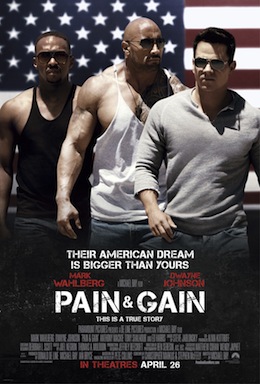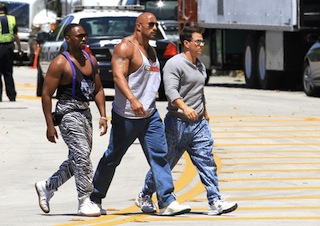 To ensure that we are all on the same level ground, let us get a couple of things out of the way. Pain & Gain is still very much a Michael Bay film. It has the look and humor that you would expect from a college fraternity brother that made a short film about his yellow Porsche.
To ensure that we are all on the same level ground, let us get a couple of things out of the way. Pain & Gain is still very much a Michael Bay film. It has the look and humor that you would expect from a college fraternity brother that made a short film about his yellow Porsche.
But there is a difference between the Michael Bay of The Rock and the Michael Bay of the seemingly endless Transformers franchise.
From 1995 to 2001, Bay made films that were well within his capabilities. They were bat shit crazy, but often had moments that were so overt and bizarre as to be cool. Bay was embracing over the top action film language and pushing it to a whole other level.
It is good for all film snobs, when they want to dismiss Bay as thoughtless and utterly lowbrow, to remember that Criterion put out versions of both The Rock (spine #108) and Armageddon (spine #40). They had good reason to do so.
 Pearl Harbor was Bay’s first major misstep. Who knows why he would take an historic event that was a sneak attack and turn it into a schlocky melodramatic action film? The result was grotesque, and perhaps it illustrates a lack of taste that runs throughout Bay’s films.
Pearl Harbor was Bay’s first major misstep. Who knows why he would take an historic event that was a sneak attack and turn it into a schlocky melodramatic action film? The result was grotesque, and perhaps it illustrates a lack of taste that runs throughout Bay’s films.
After Bad Boys II, Bay’s movies were nothing but overlong action laden commercials for credit cards, cars, toys, soda, hotel chains, and lingerie. The fact that his films always come in at over two hours made them exhausting.
Perhaps a decade of subpar garbage has set my expectations low enough that I could go to Pain & Gain and come away pleasantly surprised.
 I feel that Pain & Gain works on a number of levels and often in spite of Bay’s direction. Maybe a better way to say it might be that Michael Bay can’t help but be Michael Bay. Sometimes those hero shots that track around the main character say something other than what Bay intends.
I feel that Pain & Gain works on a number of levels and often in spite of Bay’s direction. Maybe a better way to say it might be that Michael Bay can’t help but be Michael Bay. Sometimes those hero shots that track around the main character say something other than what Bay intends.
In Pain & Gain, Daniel Lugo (Mark Wahlberg), a body builder and personal trainer, convinces two of his fellow trainers, Paul Doyle (Dwayne Johnson) and Adrian Doorbal (Anthony Mackie), to help him fleece his wealthy client, Victor Kershaw (Tony Shalhoub), for all of his money and possessions.
For all of their bumbling shenanigans, these three manage to pull off the scheme. They even are able to get the help of a crooked notary to make all of the documents legal. The only thing that trips them up is when they try the same scheme on a new mark.
 This bizarre premise fits a Michael Bay formula, but remains at least partially grounded in reality because it is based on a true story. The onscreen titles remind us in hilarious fashion, when the story seems stretched beyond what can be believed.
This bizarre premise fits a Michael Bay formula, but remains at least partially grounded in reality because it is based on a true story. The onscreen titles remind us in hilarious fashion, when the story seems stretched beyond what can be believed.
There is a weird poignancy that comes from the brilliant stupidity and reckless entitlement of Mark Wahlberg’s character, Daniel Lugo. In the hands of another director, the audience may be ever aware of both the charisma and the boundless greed that exist in Lugo. In Michael Bay’s hands, Lugo becomes a strange antihero. Many times I found myself wanting to root for Lugo, before questioning how this character was being framed within the film. I cannot say with any certainty whether the cinematic antihero framing that occurs in Pain & Gain is intentional.
If I were to venture a guess, I would guess that it was an accident.
 I know that Michael Bay was drawn to this news story, which took place in Miami in the mid 1990s. I know that this has been a passion project of his that had to take a back seat to Transformers. I also know that for good or ill Bay has one of the most recognizable visual styles of any current summer movie director. I believe that all of these things went into a blender and fortuitous serendipity occurred.
I know that Michael Bay was drawn to this news story, which took place in Miami in the mid 1990s. I know that this has been a passion project of his that had to take a back seat to Transformers. I also know that for good or ill Bay has one of the most recognizable visual styles of any current summer movie director. I believe that all of these things went into a blender and fortuitous serendipity occurred.
It is important that anyone who considers Pain & Gain for a Friday or Saturday distraction understand that just because this might be a gesture back to a time when Bay made films that were fun, if not intelligent, roller coaster rides that does not mean that his latest movie is devoid of Bay’s typical ugly trappings.
This film has the rampant misogyny and homophobia that marks all of Bay’s films. Some of these jokes worked to shape the characters, but for the most part it felt awkward and uncomfortable. I would not blame anyone for condemning Bay on the grounds of these immature and hurtful jabs. Like a visit with a racist uncle, I knew what I was in for with Michael Bay.
 Like all of Bay’s films, Pain & Gain slows to a crawl about two thirds of the way in and 30 minutes could easily be excised from its two hour and ten minute run time. Like some of his better films, Pain & Gain offers quite a few laughs, has some nice tonal shifts from dark to funny, and is pretty enjoyable if you see it with a rowdy crowd that is primed for a good time.
Like all of Bay’s films, Pain & Gain slows to a crawl about two thirds of the way in and 30 minutes could easily be excised from its two hour and ten minute run time. Like some of his better films, Pain & Gain offers quite a few laughs, has some nice tonal shifts from dark to funny, and is pretty enjoyable if you see it with a rowdy crowd that is primed for a good time.
If you can use the Transformers films as a way to lower your expectations to a reasonable level, then Pain & Gain may be a pleasant surprise for you too.
Listen to the podcast or check out Eric’s review for further discussion.







Comments on this entry are closed.